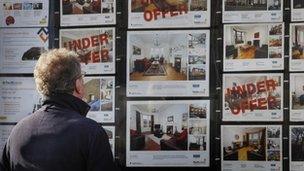House prices in 'surprising' jump, Nationwide says
- Published

Mortgage rationing by lenders remains in full effect
House prices jumped a "surprising" 1.3% in August, the Nationwide building society has said.
It was the biggest monthly rise since January 2010 and left the average UK house price at £164,729.
It means prices are only 0.7% lower than a year ago, despite the recession and continued mortgage rationing.
However, the society's chief economist, Robert Gardner, warned that "we should never read too much into one month's data".
"Nevertheless, the fact that the annual pace of house price decline moderated to minus 0.7% in August from minus 2.6% the previous month provides evidence that conditions remain fairly stable.
"This may be explained by the surprising resilience evident in the UK labour market, with further increases in employment in recent months, even though the UK economy has remained in recession," he added.
Russell Quirk, of estate agents eMoov.co.uk, said: "Read nothing more into August's 1.3% rise than low transaction levels.
"Prices are jumping around from one month to the next and September could just as likely see a reverse."
Mortgage rationing
Separate figures suggest that the Bank of England's Funding for Lending scheme, which started at the beginning of August, has yet to make mortgages cheaper or more easily available.
Commentators have pointed out that improving the flow of mortgage funds depends not so much on cutting the interest rates payable by borrowers, but on relaxing the stringent deposit requirements being set by lenders.
Figures from the financial information company Moneyfacts show that 68% of all mortgage deals on offer still need a deposit of at least 20% of the value of the home being bought.
A year ago, only 64% of mortgages required a deposit of this size.
Funding for Lending will offer lenders about £80bn of cheap money, on condition it is lent to borrowers.
At the end of July, some big lenders launched four- or five-year fixed rate deals at ultra-low interest rates of less than 3%.
These have now become slightly more expensive, with interest rates just above 3%, but in any case, they were aimed only at borrowers who could put down a 30% or 40% deposit.
At the other end of the scale, Moneyfacts says there are only five deals currently requiring no deposit at all, just 62 asking for a 5% deposit and 259 requiring a 10% down payment.
Altogether they amount to just 14% of all the deals on offer, similar to the position a year ago.
Aaron Strutt, of mortgage brokers Trinity Financial, said: "There are only four of five lenders offering stand-alone 95% loan-to-value mortgages that do not require parental assistance and the rates are still not cheap.
"There are a number of lenders offering 95% mortgages, but they often ask for a family guarantee. Also, a few of them will only lend in selected postcodes."